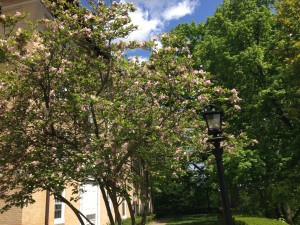This summer, I have the extraordinary privilege of being a Fellow with the GIFT program here at Tufts University. GIFT is a clever acronym for Graduate Institute For Teaching and it’s really an amazing program. Every summer, fellows are chosen from amongst Doctoral Candidates university-wide to participate in the institute. Seminars are held in various aspects of teaching and pedagogy and are conducted by top teachers from all of the disparate departments.
So far, the seminars have been delightful and extremely applicable to my job. I’m learning

A pano of my book fort that I took to show the other fellows what my workspace looks like
a lot about teaching, and I’m learning a lot about being a graduate student.
You see, this is the first time that I’ve encountered other Tufts Doctoral Candidates in the wild. This is the first chance I’ve had to have close contact with a group of people so very like me, but also incredibly different. Lunchtime chats are dominated by discussing the similarities and differences in our fields, what Quals are like, what it means to work on a dissertation or culminating project, and what we expect to do when we grow up.
And the food. I have to say this about being a Fellow: in addition to being a really cool title (tee hee… I’m a “Fellow”), it also comes with certain expectations. You work hard, you make sure to represent your department in the best light that you can, and you try your hardest not to get fat. They’re feeding us really well at this program and it’s definitely been a source of mid-day delight and end-of-day regret.
In all seriousness, having somewhere to be every day first thing in the morning is a welcome change of pace. I wake up, I have coffee, I dress like I care what other people think of me. I’ve worn two blazers this week and four different pairs of shoes. The isolation of graduate study is a really crushing beast to deal with and my involvement with this program has been pivotal to understanding several concepts which, in theory, I knew but which, in practice, I had yet to truly uncover for myself. Impostor syndrome affects all of us. We all have trouble doing one thing or another and that doesn’t reflect our expertise as professional academics, just our growth as humans. There will always be a student who you don’t quite know how to reach, but with the right support system you can better enrich both her experience in the classroom and yours.
The program is a lot more intense than I was expecting it to be and I have found that I’m exhausted at the end of the day (and certainly now, at the end of the week, I’m dragging to get through the last tasks I need to accomplish before I can rest a bit this weekend). It has been so very worthwhile already, though, and I’m excited to see what the rest of the program has in store.
Also, you’ve never felt like you’re in an incredible discussion until you’ve been in a room full of budding experts in fields from Theatre History to Theoretical Physics. Just saying, we’re pretty smart.



